Winter 2024 DragonNews

OPPORTUNITY ISSUE
• 10 best things to do in Hangzhou
• Alumni interview: Lucinda Liu
• Creating happiness in Early Years
• A wild time in the great outdoors
• Tropical trip: Jeju remembered





• 10 best things to do in Hangzhou
• Alumni interview: Lucinda Liu
• Creating happiness in Early Years
• A wild time in the great outdoors
• Tropical trip: Jeju remembered





Dear HIS Community and Friends,
As the seasons change and we find ourselves on the cusp of new beginnings, it is a pleasure to present to you the latest edition of our seasonal magazine, themed “Embarking on a Voyage: Opportunity Issue.” This edition highlights some of the efforts and accomplishments within our community to meet our annual schoolwide goals and also celebrates the diversity and dynamism of our truly unique place of learning and growth here at Hangzhou International School.
Our schoolwide goals for this year are:
1. Take Harbor/Shelter and Assess: We will begin by taking harbor and assessing the team and students we will serve, ensuring we understand their needs and strengths.
2. Set Sail and Monitor: As we set sail together, we will monitor individual progress closely, providing constant feedback, reassessing, and redirecting our efforts as needed.
3.Optimize Time for Student Service: We will continue to evaluate how we best use our
time to serve our students, enhancing their educational experience.
4.Enhance Professional Development: We aim to improve access and connections to professional development, especially in language growth, to better support our educators and students.
5. Expand Wellness Initiatives: We are committed to expanding wellness initiatives for all, ensuring the well-being of our students, staff, and families.
HIS is more than just a school; it is a vibrant tapestry woven from the threads of over 50 nationalities, each contributing to the rich cultural mosaic that defines our community. With almost 1000 students from Early Years to Grade 12, we focus considerable effort in offering a nurturing environment where every child is encouraged to explore, discover, and thrive. As a three-program International Baccalaureate (IB) school, we are committed to providing a holistic education that

fosters intellectual curiosity, critical thinking, and a lifelong love of learning.
The theme of this issue, “Opportunity: Embarking on a Voyage,” is particularly poignant as it reflects the journey of discovery and opportunity that each member of our community undertakes. Whether it is a student’s first day in the Early Years program, a middle schooler navigating the complexities of adolescence, or a senior preparing for the next chapter of their academic journey, every step is a voyage filled with potential and promise.
In this edition, you will find stories of resilience, creativity, and achievement from our students, teachers, and alumni. From innovative classroom projects to inspiring personal narratives, each article is a testament to the spirit of exploration and the journey of academic and personal excellence that defines HIS. We also highlight some of the many opportunities available to our students, from extracurricular activities and community service projects to international exchanges and academic competitions.
As we embark on this collective voyage, we are reminded of the importance of embracing new challenges and seizing every opportunity that comes our way. We hope that this magazine will inspire you to reflect on your own journeys and to celebrate the incredible achievements of our community.
Thank you for being a part of the HIS family. Together, let us continue to navigate the seas of opportunity with courage, curiosity, and a commitment to excellence.
Goooooo Dragons!!!


Jeffry R. Stubbs Superintendent, Hangzhou International School

September 25
More than 150 HIS parents and friends spent the afternoon together in the ballroom at the Le Méridien Hangzhou, where they enjoyed great food and fun games as they welcomed in the new school year.







October 15
On Tuesday October 15, Hangzhou International School (HIS) held our annual Blood Drive. Led by students, this initiative sees HIS parents and staff come together to donate blood to the Zhejiang Blood Centre. The student-led project was initially started in 2019 by an HIS alumna, Manya, and has since been continued by Grade 12 student Saanvi.
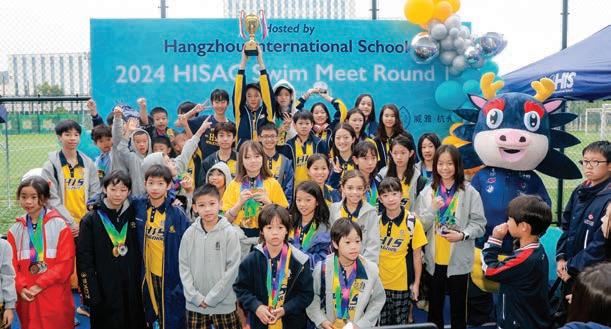
October 25
Ongoing professional development is a key part of being a teacher at HIS. For our first Professional Development Day, our Lower School faculty participated in an engaging and enriching two-day International Baccalaureate (IB) workshop entitled: “Action, Agency and Engagement.” During the workshop, our teachers explored various strategies to inspire and support our students in engaging in purposeful, authentic, critical, and mindful action and agency within their learning. Special thanks to our IB facilitators and workshop leaders Jarrett Brown and Shameek Kumar Ghosh who joined us to lead the two-day workshop on campus.
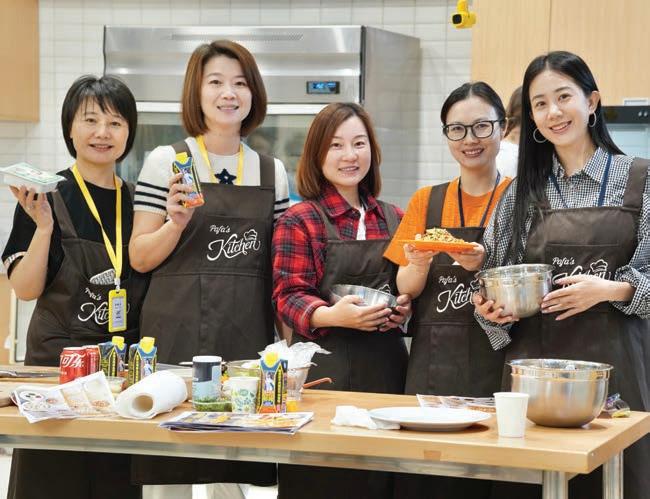
October 19
Gold Dragons Swim Team emerged victorious at the HISAC Round 1 Swim Meet, competing against nine other schools in Hangzhou and achieving many personal bests.
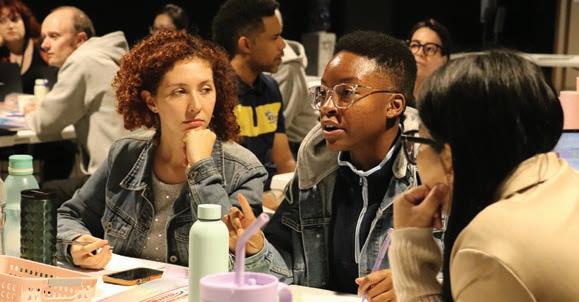

Our amazing PAFA team have held multiple PAFA Kitchens so far this school year, variously exploring Mexican, Chinese, Indo-Chinese, and Algerian cuisine with our wonderful community parent chefs. The classes welcomed a mix of familiar parent faces and newcomers, all buzzing with excitement and enjoying the chance to connect and cook together!

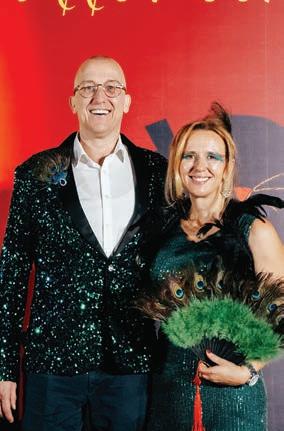


November 2
Halloween Spooktacular was a spooky success! The night was packed with activities, spooky games, delicious food from our community partners, and even an amazing Student Council haunted house that brought out many shrieks. A huge thank you to all our wonderful parents for planning and organizing, and everyone who helped support this wonderful annual event. Scan the QR code for more!





November 21 and 22
Our Upper School stars truly rocked the stage at their November musical performance of ‘We Will Rock You!’ From the singing to the acting, dancing and even live guitar, they truly delivered a ‘killer’ performance in the spirit of Freddie Mercury and Queen. We are so proud of all of them. Congratulations also to the directors, crew, and everyone involved in the show for their incredible hardwork in bringing the legendary music of Queen to life on stage.


Scan the QR code for more!


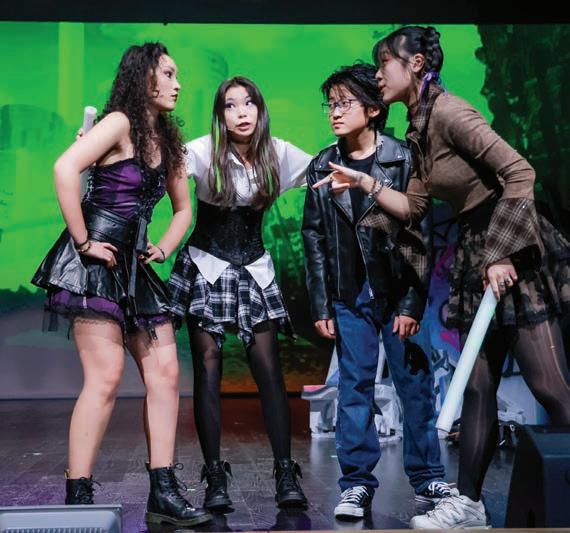






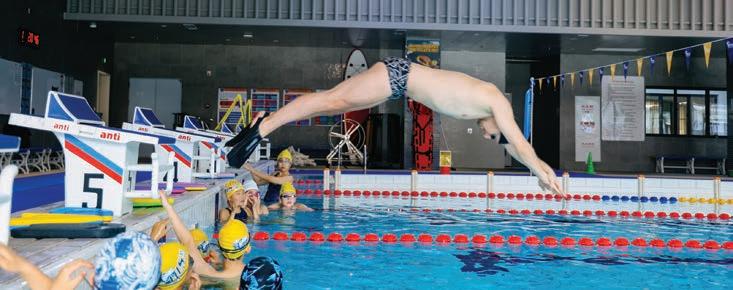
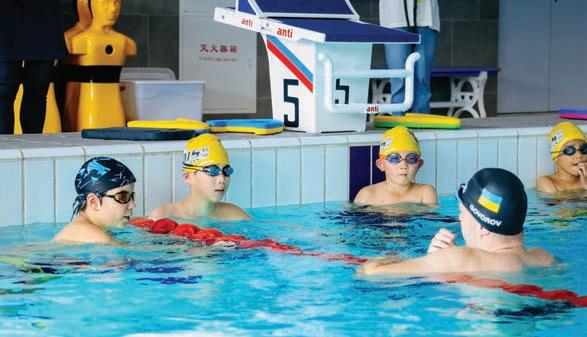

November 23 to 25
A huge heartfelt thank you to our favorite Olympic swimmer Andrii Govorov for training our Dragon swimmers in a 3-day high-performance swim clinic at ‘The Wave’ once again. Hailing from Ukraine, Andrii holds the World Record in 50m butterfly at 22.27 seconds. During his three-day visit, Govorov coached our swimmers on advanced swimming techniques, exercise drills, and personalized race strategies, training side-by-side with our students. Outside of the pool, he inspired our swimmers with his wisdom on perseverance and boosting self-confidence.




December 1
Our HIS community is already in the festive spirit and embracing the winter chill in style! We had an absolute blast at our annual Winter Fair, which featured student performances, homemade crafts, delicious food, and even a surprise visit from Santa. It’s events like these that make us so proud of our school community. A special shoutout goes to all our talented students for their fantastic musical performances that added to the magic of the day.


Scan the QR code for more!



YUKO YANAGIMOTO | HIS Parent
My name is Yuko, I come from Japan. After having lived in different parts of the world, I came to Hangzhou 15 years ago. I love Hangzhou for its beautiful balance between history and modernity, nature and city. And I have always tried to stay between a local and a tourist; that is, I make myself feel at home, yet I’m curious to discover new things here.
Below are the top 10 things I enjoy doing with my 8 and 10-year-old kids.
Hangzhou has one of the most beautiful botanical gardens in China. Situated within a tourist area near West Lake, it’s so huge inside that you never feel crowded at any time of the day or year. You can place picnic mats, walk under hundredyear-old camphor trees and visit the Han
Meilin Museum (Han Meilin is one of the greatest masters of Chinese modern art.)
Kids love the colorful paintings of animals and sculpture pieces such as ‘Mother and Child.’ There is a gigantic Buddha head at the museum entrance too! Opposite from the Botanical Garden is the Flower Nursery. Here, the highlights are the impressive pine tree bonsai garden and the orchid nursery (hidden, but possible to observe from outside how professionals take care of rare species of orchids.)
I only ever visit West Lake at sunrise –that’s my recommendation to avoid the crowds and enjoy the peace. The day before, book the smallest boat (they seat 4 to 6 people) at the earliest possible time – ideally just before the sunrise; prepare a packed breakfast and bottled


hot coffee, and blankets in the colder season. Meet the boatman, and as the boat departs the shore, you start to notice the disappearance of darkness... and the sun slowly appearing.
Regardless of which route you choose, almost the whole lake is yours at this time of the day. Even if you come across another boat, you will want to say hello to each other (not the case in the crowded daytime.) Make sure the kids learn some historical stories about West Lake from the boatman, as well as the names of birds and plants unique to West Lake. Believe it or not, the sunrise has an invisible energy for our life, so it’s something I insist in doing with my kids at least once a year.
As a parent not practicing any religion, it has been a question for me how to teach kids what religion, or belief is. Hangzhou is said to have had thousands of Buddhist temples in early history, and today hundreds remain, such as the famous Lingyin and Jingshan Temples. But I don’t want the kids to think that the temples are just theme parks with Buddha statues.... so I take my kids to temples only in the early morning.
Many temples open their doors to religious people for morning chanting – it is before tourists start to come in, and it is when the temples are in true peace and dignity. We observe the ritual, enjoy the humble breakfast with the monks and walk around to find gems of art and

history. The kids love following the path of Ji Gong, a historical monk who once lived in Jingci Temple and other temples in Hangzhou – his character and deeds are similar to those of Robin Hood!
There is a rapidly growing trend for artisan markets in Hangzhou. Almost every weekend, you can find some markets going on in different locations in the city. We can spend the whole day there – I enjoy tasting different craft beers while kids search for interesting toys or accessories to buy. So far, the kids’ best catch was the dragon figures made by 3D printing bought in a weekend market at Tianmuli Square.
Hangzhou is one of the earliest cities in China to host live jazz bands from overseas, thanks to the JZ Club, which has been there for almost 20 years on the crowded side of West Lake. In addition, most music clubs and bars in Hangzhou

are very safe and clean (non-smoking), so I have been taking my kids to jazz clubs since they were 3 years old. There are a few good clubs now with, at times, very high level international and Chinese jazz musicians. A few musicians told me they felt much more energy from the audience in Hangzhou than in Shanghai!
Going for a nature walk is always a good way to understand your city from different perspectives. From the top of a mountain, you see for the first time how the city is structured. Our city has developed around two main bodies of water – West Lake and the Qiantang River. If you follow with your eyes to the west side of the West Lake, and zoom in (if possible), you will see something very unique to Hangzhou…Longjing tea trees.
From afar, they look like a big herd of sheep as they are round and not so tall. Normally after the harvest season in spring, the tea plantations are peacefully abandoned for the kids to play hide and seek with the ‘green sheep’, as we call them!
China’s most popular and competitive art school is in Hangzhou, which is why it’s called the China Academy of Art while the one in Beijing is the Central Academy of Fine Arts. So, see the difference, right? China is such a rapidly changing society, and artists, whenever and wherever, are the first people to express best the ‘feeling’ of the time and place. So I visit with my kids every year’s graduation exhibitions at the China Academy of Art.
Now the campuses have spread to different locations (the newest one is very close from HIS!) and exhibitions may sometimes take place in museums or commercial facilities too, but we visit all... to try to interpret ‘what’s happening here now.’ Surprisingly, the kids interpret better than I do!
It’s not surprising at all Hangzhou has the nation’s best art university... as it has always been an artistic city. From early history to today, it has produced numerous talented painting and

calligraphy artists, and the city has done an amazing job to preserve many of the original pieces at its important sites. One worthwhile angle to study is the placards, known as paibian in Mandarin, and the couplets, duilian.
You will see them as one set in almost any historical architecture. It’s a good way to study Mandarin and to learn some words of wisdom from Chinese philosophy. Many of them were written by historically famous artists or political leaders and have been made into beautiful, sustainable artwork, while in many other cities, they may have been done by computer fonts. West Lake is definitely a gem of these paibian and duilian, so I have told my kids to make a book to collect all someday.
Coming from the hotel business myself, I feel kind of tired of being ‘served’ sometimes. So, for some holidays, I have instead headed to ‘ecological villages’, all within 1 or 2-hour’s drive from Hangzhou, where everyone can be a staff and a guest at the same time, and a master of the place. It’s definitely a new lifestyle and business model which gives us a chance to reconsider where ‘life’ comes from and how ‘community’ works when we are in total nature with minimum modern comfort. This year we enjoyed the rice that the kids raised and harvested last year... and it’s full of memories of getting muddy and swimming in the streams.


It seems as if bookstores are disappearing everywhere in the world, but it’s still one of the best places to spend on a rainy day. One favorite is Tsutaya Bookstore, a traditional Japanese chain, in Tianmuli Square. Photogenic outside and inside, it has a cafe and a salon, as well as their huge collection of imported books and stationery (it was the first Tsutaya to open in China in 2020, and prior reservation was required to visit for the first several months!).
The other is Xiaofeng Bookstores, a local Hangzhou chain established in the 1990s. Their book collection is rather more on the modern literature side, with some Chinese classical and some overseas influenced titles. But the interesting point is that the stores are built in the most intellectually iconic spots of Hangzhou – inside the national museums, universities, press offices, and even temples and hospitals! It’s always been a weekend treat for the kids to visit one of these bookstores and spend hours to choose one of two books that I promised to buy for them.

ucinda Liu is an HIS alumni who joined us in grade 8 in 2013, fitting right in with the HIS community, and walked across the graduation stage in June 2017. Lucinda was a top student during her time at HIS and ultimately achieved an exceptional IB score of 42/45. Beyond her stellar academic achievements, she also took on many leadership roles in varsity sports and student council.
Following her time at HIS, Lucinda pursued a Bachelor of Science degree in Business Administration at the prestigious University of Southern California (USC). Today, she shines brightly in the finance world and currently works as a Consumer Investment Associate in San Francisco, California.
WHEN DID YOU ATTEND HIS AND HOW LONG WERE YOU HERE?
I attended HIS from 2013 to 2017 (Grade 8 through 12).
CAN YOU SHARE MORE ABOUT YOUR JOURNEY AT HIS?
When I first attended HIS, after moving from Vancouver, I was a bit scared to start afresh: from having to make new friends to getting accustomed to a different education system.
The friendly faculty and students at HIS quickly helped me work through this transition, and I remember looking forward to going to school every day.
The rest is history, with five years of fond memories – engaging in interesting classes,



building close bonds with my classmates, and trying out new extracurricular activities. I’ll be forever grateful for my experience at HIS, and the community I was able to build during my time there.
WHAT ARE SOME OF YOUR FAVORITE HIS MEMORIES?
Definitely just hanging out with my classmates in general. My class was very small (around 13 people), and some of my favorite memories were us all hanging out and joking around in the “Senior Lounge” (which was really a small area next to a staircase with a couch and AC!), and exploring local culture together on China trips.
WHAT KIND OF CO-CURRICULAR ACTIVITIES (CCAS) DID YOU JOIN AT HIS? HOW DID THESE HELP YOU TO ACHIEVE SUCCESS?
I played a lot of sports (volleyball and basketball mainly) and also participated in student council. These experiences taught me the importance of teamwork, which I carried with me into college and the workplace.
AFTER GRADUATING, WHAT UNIVERSITY AND PROGRAMS DID YOU ATTEND?
I studied Business Administration at the University of Southern California in sunny LA.
WHAT ARE YOU CURRENTLY UP TO?
After college, I spent about two years working as an investment banking analyst in Evercore’s technology team in Menlo Park, helping advise tech acquisitions. After that, I’ve been working at VMG Partners as a consumer investment associate, working with a lot of interesting consumer brands such as Drunk Elepant, Solidcore, and Sun Bum.
“I felt incrediblyfulfilled during my time at HIS because of the inclusive environment, which helped me build character as time went on”
WHAT VALUES OR LESSONS DO YOU STILL CARRY WITH YOU TODAY? ANY ADVICE FOR CURRENT STUDENTS ON MAKING THE MOST OF THEIR OPPORTUNITIES AT HIS?
I would encourage students to try new things and take ownership in areas that interest, both inside and outside the classroom, and within the local community.
Living in one of the most interconnected countries in the world, I was very lucky to have access to abundant resources to dabble with. If you have an idea that interest you, whether it’s a community project or business idea, you should go for it!
WHAT ARE THE THINGS YOU MISS THE MOST ABOUT HIS?
I miss the faculty and how much they cared about the students’ development and success, as well as all the genuine friendships I was able to build. I felt incredibly fulfilled during my time there because of the inclusive environment, which helped me build character as time went on.
HAVE YOU KEPT IN TOUCH WITH ANY OF YOUR CLASSMATES?
Of course! During the years, my best friend and I (Xenia Niesel, who was at HIS for 13+ years and is now living in Vancouver) have visited each other a few times; I always make sure to hit up my other classmates whenever I’m in their city.
Interestingly, I’ve also connected with fellow alumni who are doing amazing things in their respective fields without knowing that they also attended HIS, and we loved finding out that we had attended the same school in Hangzhou! It’s truly a small world and the community HIS has built is amazing.
Interview by NATALIA STUBBS PR & Communications Specialist



Meet Chaddwick and Heather Plotz, a teaching couple at Hangzhou International School, who have two children at school, and one at home. Perhaps uniquely, they met each other at HIS, have two children born in Hangzhou, left the school for a few years and then came back. This is their HIS story.
LET’S GO BACK TO THE START –WHEN DID YOU FIRST WORK AT HIS, AND WHAT ATTRACTED YOU TO THE SCHOOL? WHERE WERE YOU WORKING BEFORE YOU CAME TO HANGZHOU?
Before moving to Hangzhou the first time, Chaddwick was in the UAE and Heather was in the USA. We both first started at HIS in August of 2016. We were not together at that time, but our reasons for coming were very similar. We both wanted to go to a school that was growing, in a country with a rich historical history, and a high academic standard. China had (has) taken on a larger worldwide presence, and we both thought we could be learning and living in a country that was emerging on the world stage. HIS offered a strong community, academic opportunities, and a chance for future professional growth.
WHAT WERE YOUR FIRST IMPRESSIONS OF HIS, AND DO YOU REMEMBER YOUR FIRST DAY AT SCHOOL?
Chaddwick was coming from a place where everything was over the top, so he had more of an adjustment. HIS was very welcoming as a new hire and really tried
CHADDWICK PLOTZ | Upper School Social Studies Teacher
HEATHER PLOTZ | Grade 3 Teacher
to help establish a relationship with us and make us at ease being in a new country.
At that time there were not all the apps and conveniences new teachers have today, so the school tried to help us be able to adjust and get the things we needed in a country where we did not speak the language. These things made our cohort very close, and we did many things together the first two years.
The first day of school was a blur, but we both remember the morning assembly in the gym and our introduction. Chaddwick remembers having 12 students in his 5th grade classroom and working to learn their names. That was the Class of 2024 that just graduated and some of them came to say hello this fall before heading off to university!
Heather remembers having 22 kindergartners and being so thankful to have a co-teacher to help along the way. The campus felt huge with the little ones and she was still adjusting to moving and starting a new job abroad.
YOU WORKED AT THE OLD CAMPUS BY THE RIVER, WHAT ARE YOUR MAJOR MEMORIES OF IT?
The mosquitoes. It seemed they were always present! The open hallways made very cold bathrooms on a winter day or sweltering hallways on hot days, especially August. There was not a centralized heating or cooling system. We don’t think anyone will forget that.

The outside picnic tables for lunch were always enjoyable. We do not miss having a neighboring school or “The Death Star” right in our lap. We do miss the ease of being able to walk to school.
We also had the performance space above the cafeteria before they turned it into the Art and STEAM rooms. This room provided us with lots of memories, including faculty game nights, big Thanksgiving dinners, staff art nights, and more.
I UNDERSTAND THAT YOU ACTUALLY MET EACH OTHER AT HIS! WAS IT LOVE AT FIRST SIGHT?
Yes! We started dating by the end of the first semester, enjoyed many travels together, and then were married at the end of 2018. We had our first two children here in Hangzhou and our third in America.
It’s amazing to us that we moved to China and met one another when we only lived 5 hours drive apart in the USA. It is
definitely convenient now when we travel home to family on holidays.
UNFORTUNATELY, YOU THEN HAD TO LEAVE DUE TO COVID, WAS IT DIFFICULT TO SAY GOODBYE?
It was. Both of us had really settled in within the community and school and were involved with many things. We had two of our children here and had friendships with people within the community and in different areas within the region.
Both of us enjoyed our jobs, and the students we were teaching. We loved the international lifestyle and the opportunities for us here at HIS. Neither one of us thought we’d ever return to the USA to work.
THEN IN 2024 YOU RETURNED, THIS TIME WITH THREE CHILDREN IN TOW! HOW DID IT FEEL TO COME BACK? WAS IT A DECISION YOU NEEDED TO THINK FOR LONG ABOUT?
We did think about returning overseas for a long time and were very selective in the schools we would accept. Though actually, the return to HIS and Hangzhou was easy.
In returning, we came to a school where we knew people and did not need to relearn all the daily things that usually
come up like, ‘Where is the grocery store?’, ‘How do I get from Point A to point B?’, ‘Are there health clinics or a good dentist?’, ‘How do I use Taobao?”
We already knew all this and so coming here with the three children was much less stressful. We were very excited about what our children were about to experience.
DID HANGZHOU CHANGE MUCH IN THE YEARS YOU WERE AWAY? WHAT DID YOU MISS ABOUT IT?
Yes. Slims restaurant and our favorite noodle shop at the mall are now gone. These are two big losses. Other than that, it seems more teachers now are driving cars.
We missed the weekend hiking in the mountains, and the nightly walks along the river. We also missed the culture and people here.
THE NEW CAMPUS IS QUITE DIFFERENT FROM THE OLD ONE. WHAT WERE YOUR FIRST IMPRESSIONS?
Yes, it is very different, but in a good way. Of course we had many memories at the old one, but coming back to a new campus was like a fresh start since we’re ‘new’ again. The new campus is beautiful and offers wonderful learning opportunities for students.

HOW DIFFERENT DOES IT FEEL TO BE AT HIS NOW THAT YOU’RE NOT ONLY TEACHERS AT THE SCHOOL, BUT ALSO PARENTS? IS THERE A DIFFERENT SENSE OF CONNECTION WITH THE COMMUNITY?
One of the main reasons we returned was the opportunities that HIS offered our children. We knew of many of the programs and activities and HIS has expanded what they do since we left. We also wanted our children exposed to other cultures and to start learning a second language at an early age.
The idea of them learning Mandarin was important to us as we see this being an advantage to them in their lifetime. As a parent, you do have a better understanding of some of the questions teachers are often asked. You also have an inside track as to the problems parents have, because you may experience it with your own children.
IN 3 WORDS, SUM UP WHAT HIS MEANS TO YOU.
Opportunities, Experiences, Adventures... and Home.
Interview by SIMON OSTHEIMER Communications Manager


LILY ZHOU | Lower School Mandarin Teacher
uring this splendid autumn season, our Lower School Mandarin Department organized a cultural excursion for all staff members. Our destination for this trip was the historic city of Meicheng, renowned for its millennium-old heritage.
Our first stop was the historic town center of Meicheng, a city renowned for its rich cultural heritage and vibrant atmosphere. The ancient town offers a diverse array of snacks and numerous shops, inviting exploration. Our teachers embraced a leisurely pace, immersing themselves in the local culture and artistry of this historic locale.
The town features picturesque buildings reflected in the water, and elegant bridges spanning the waves. To further connect with the region’s heritage, our teachers donned traditional costumes representing county officials, prefects, and generals and
participated in a “prefectural patrol” to experience traditional customs firsthand. Following a delightful local lunch, our teachers engaged in the exploration of the intangible cultural heritage known as the ‘Nine Surnames Fishermen’s Wedding Custom.’
According to legend, during the Ming Dynasty, a military unit that failed to resist Emperor Zhu Yuanzhang was exiled to live on the water. Over the centuries, this community developed a distinct way of life and unique cultural practices.
The ‘wedding on board’ ceremony encompasses various rituals, including ‘welcoming the bride,’ ‘presenting the dowry,’ ‘sharing rice with the bride,’ ‘carrying a wooden basin and sedan chair,’ ‘seeing the bride off,’ and ‘meeting the parents-in-law at the bow of the boat to worship heaven and earth.’ Our teachers enthusiastically participated in

this captivating series of wedding customs while dressed in traditional wedding attire.
After exploring the captivating fishing village, we took advantage of the beautiful autumn weather to pick seasonal oranges. Upon entering the orchard, we were greeted by lush orange trees, with golden oranges dangling from the branches like small lanterns, glistening enticingly in the sunlight.
Teachers and their children moved among the trees, their laughter resonating throughout the orchard. The experience of picking an orange by hand—feeling its sun-warmed skin and inhaling its natural aroma—was truly rewarding. As we gently peeled the fruit open, a delightful sweet and sour fragrance filled the air. Our trip concluded with everyone gathering a bountiful harvest, leaving us all with a sense of happiness and rich experiences.

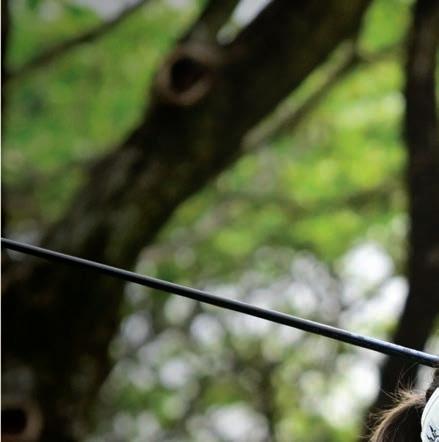













“As
the first HIS student athlete to join a US College NCAA Division Golf Team, I hope to inspire students to undertake challenges and chase their dreams”
Athena Ni
Class of 2024, Athlete of the Year
Graduated from HIS with High School Diploma and IB Diploma (IBDP)

World-ranked amateur golfer Top 3 in Zhejiang Province
Attending University of Washington

NCAA Division Golf Women’s Team


HIS is an award-winning international IB World School situated in the beautiful city of Hangzhou that offers both a rigorous and well-rounded learning experience beyond the classroom. We serve over 970 children of foreign nationals in Early Years through Grade 12 and represent more than 50 nationalities in our diverse community.

SHAUN RUSSELL | Upper School Librarian
s winter settles in, the cold weather provides opportunity for our students to dive into the cozy world of reading.
While the academic learning continues, we should remember that reading for pleasure plays an important role in enhancing overall academic success. Research has consistently shown there is a positive correlation between the amount of reading we do and our performance at school; and this is why we at HIS think it is important that our students form a consistent and ongoing ‘reading for pleasure’ routine.
Reading widely not only fosters curiosity and enjoyment but also supports cognitive and vocabulary development, written and verbal communication skills, and critical thinking. Exploring various genres and topics can also spark an appetite for learning that goes beyond the classroom.
As we all know, digital distractions in the form of phones, iPads, laptops, and

gaming consoles are everywhere, and are a constant pressure on our children’s time. As such it’s essential that we provide encouragement and opportunity for students to engage regularly with books that interest them. Whether it’s fiction, non-fiction, or graphic novels, the key is to find what resonates with each child.
To help find relevant stories of interest, we strongly encourage our students to take advantage of the three HIS Libraries (ECE, Lower School and Upper School) during the winter holidays, and beyond. Our libraries have a huge number of amazing titles by fantastic authors just waiting to be taken home, and not just by students – parents are also encouraged to loan out our books.
Parents, your involvement is particularly important. Because, for students to develop a healthy ‘reading habit’, and to get books into their hands, really does involve a collective effort between parents, teachers, librarians, their friends and the students themselves.
In My Friend the Octopus by Lindsay Galvin, you get taken on an adventure that explores friendship and curiosity through the eyes of a young girl and her octopus friend. It’s a charming tale and a perfect winter read. It pairs with its companion, “Darwin’s Dragons,” for an exploration of nature and discovery. For fans of: Historical Fiction, Animals, Fiction and Adventure

That’s why I invite you to borrow books alongside your children. By participating alongside their reading journey, you can model healthy reading habits and foster a love for reading in your family. Sharing thoughts about what you’re reading can lead to meaningful discussions at home, reinforcing the value of reading.
As a bonus, for Upper School readers, we also have an adjacent café with a wonderful atmosphere to lounge in.
As academic Taylor Hicks notes in his research, “the more students read, the greater their chances of performing well academically”.
This winter let’s commit to making reading for pleasure a priority in our lives. Encourage your children to discover the joys of reading beyond the curriculum and witness the positive impact it can have on their academic learning.
Together, let’s cultivate a community of readers at Hangzhou International School!
In The Rema Chronicle: Realm of the Blue Mist by Amy Kim Kibuishi, you will get swept into a beautifully crafted fantasy world where a young heroine, Tabby Simon’s embarks on a quest to uncover the truth behind her family’s legacy and the mysterious blue mist that shrouds her realm. It has vibrant landscapes, strange worlds, a big sense of adventure, as well as a battle against dark forces. Perfect for ages 10 and up, especially if you love a thrilling journey with a rich story.

Lower School students review their favorite library books this semester! To discover many more fantastic titles and to learn more about the Lower School Library, please pay a visit or contact Ms Ingrid Majoos: ingridmajoos@hisdragons.org.cn.

Reviewed by Yu-Ching


Reviewed by Lisa
by Sophie Escabasse
A girl called Effie moves to Brooklyn, New York to learn magic from her grandmothers, who are half witches. The girl then learns more and more, and shares the magic with her friends.
Favorite part: When a famous singer accidentally turns her face super red, Effie makes a potion and fixes it!
by
George O’Connor
Shunned before she was even born and destined to live a life alone, Artemis, the wild Goddess of the hunt, finds power through her hunting ability and mighty bow.
Favorite part: When the boar comes!
by Debbie Dadey
Echo Reef is doing tail flips because she is going to see her favorite show. They are performing for her classmate’s birthday.
Favorite part: When Mr. Fangtooth laughs even though they had gotten into trouble.


Reviewed by Claire


JESSICA JOHNSON | Lower School Vice Principal & PYP Coordinator
t HIS, we believe the key to providing an exceptional educational experience for our students lies in our teachers’ continuous growth and development.
Professional development equips our teachers with the latest pedagogical strategies and techniques. By participating in workshops, seminars, and collaborative learning opportunities, our teachers can refine their skills, ensuring they are wellprepared to inspire and engage our students.
Education is an ever-evolving field. Through ongoing training, our teachers stay informed about the latest trends in education, technology, and curriculum design. This knowledge allows them to adapt their teaching methods to meet the diverse needs of our students. Additionally, professional development fosters a culture of collaboration among staff.
When teachers share insights, strategies, and resources, they are creating a supportive community that benefits everyone involved, teachers and students alike. Research shows that effective professional development leads to improved student performance. When our teachers grow professionally, they can provide more meaningful and impactful learning experiences, which ultimately helps our students thrive academically.
Recently, 50 members of our Lower School faculty participated in an IB workshop entitled: ‘Action, Agency and Engagement’. Two IB facilitators joined us
to lead the two-day workshop right here on our HIS campus. During the workshop, our teachers explored various strategies to inspire and support our students in engaging in purposeful, authentic, critical, and mindful action and agency within their learning. Here are some key takeaways:
: According to the IB, engagement transcends making connections or taking action; it embodies the desire to act coupled with the compassion to follow through. Teachers explored varying ways to guide students in making choices about their engagement and potential opportunities to then take action.
: Teachers delved into the concepts of agency and action, discovering how these can manifest across our Program of Inquiry. The IB defines agency as students having ‘voice, choice, and ownership’ of their learning. This understanding helps us create a learning environment where students feel empowered to make choices and take initiative.
AND TAKING ACTION: Teachers explored ways to identify and create opportunities for students to have agency within their learning experiences. This includes fostering an environment where students can ask questions, pursue interests, and reflect on their learning. Additionally, we learned to identify ways in which we can support students to take action based on their learning experiences.
As teachers implement these newly learned strategies in our classrooms, I encourage you to engage with your child about their learning experiences. Ask them questions like:
What are you curious about right now?
How do you think you can take charge of your learning?
Can you share a recent learning engagement or assessment where you made choices about what to learn or how to express your understanding?
Why is that important to you?
What action can you take based on what you have recently learned?
In closing, at HIS, we recognize that the foundation of an exceptional educational experience for our students is rooted in the continuous growth and development of our teachers. Through professional development—encompassing workshops, seminars, and collaborative learning—our teachers refine their skills and stay current with the latest pedagogical strategies, trends, and technologies.
This commitment ensures they are well-equipped to engage and inspire our diverse student body, adapting their teaching methods to meet individual needs in an ever-evolving educational landscape.
CAROLINA PERDOMO | Early Years 1 Teacher
NINA GRIZZLE | Early Years 2 Teacher
EMMA JOHN | Early Years 2 Teacher






It’s no exaggeration to say that the Early Years provide the very foundation of children’s future educational experience.
The ages of 2 and 3 are a hugely important time when children develop physically, socially, and emotionally whilst becoming aware of the world around them.
There is a misconception that, due to the brains of young children, they are unable to understand concepts that are considered more complex. However, within the Early Years, age-appropriate play opportunities are offered to engage children in their learning and to develop agency as they choose the activities that most interest them.
Action is an integral part of the learning process of the IB Primary Years Programme (PYP), which we follow at HIS, and it is considered the core of student agency.
Action comes as a response to the inquiry, and through it, students show the connections they have made between real-life situations and their learning at school, while developing a sense of belonging to their communities.
In the PYP, action can happen at the individual or collective level, and it is a “meaningful, mindful, responsible and responsive” process.
Action at the individual level is what we see most often in Early Years as students
are starting to understand the collective. It often comes in the form of small changes of behavior, demonstration of responsibility, making appropriate choices, and demonstration of respect for self, others, and the environment.
As educators, it is not our responsibility to take action on behalf of our students, rather it is to empower them to think, take responsibility for their learning, and make their own connections.
To extend their thinking, students are invited to take action at the collective level by taking part in bigger projects in their units of inquiry. The students recently learned about different emotions during their ‘Who We Are’ unit of inquiry, and particularly connected with ‘happiness’.
Thought was given to how the children could apply their learning both in their everyday lives and in the lives of others. They were asked how they would feel about creating a happy space for the ECE building.
From there, the students created a blueprint of the space and what they wanted to put into it. They gathered the needed materials and created their own before setting up the space.
Through this process, the children took ownership and pride in the work that they had created for themselves and others.

he annual ACAMIS (Association of China and Mongolia International Schools) Technology Conference is a must-attend event for anyone passionate about education and technology. The opportunity to connect with forwardthinking educators from around the globe and engage in meaningful discussions makes the journey to each host city truly worthwhile.
This year, the conference was held at Renaissance College in Hong Kong on 19-20 October, where I had the pleasure of being a presenter. The experience was nothing short of enlightening, filled with engaging workshops and discussions facilitated through the Whova App, allowing participants and speakers to tailor their schedules to their interests. Educators from diverse nationalities and regions across China came together to foster a rich environment for collaboration and idea exchange.
The event kicked off with a compelling keynote speech by Anurupa Ganguly, an MIT graduate and the founder and CEO of PRISMS. Her vision for a new, real-life way of learning through Next Generation Spatial Computers resonated deeply. Ganguly shared a powerful perspective that struck a chord with many in the room: we often pursue education for personal gain – grades, degrees, jobs –yet rarely consider how our learning can contribute to the greater good.
Her emphasis on shifting our mindset to view education as a means to solve
real-world problems was inspiring. PRISMS embodies this philosophy by sending students on virtual missions to address pressing environmental and societal issues. The students’ work and project developments are often used to actually solve those very real global issues.
Throughout the conference, we had ample opportunities to engage with hands-on experiences, including VEX robotic systems and sessions centered around AI. The discussions on navigating AI ethics in the classroom were particularly meaningful, prompting educators to reflect on the implications of technology in their teaching practices. I especially enjoyed the ‘Demo Slams’, where educators showcased innovative tech features designed to simplify our teaching lives. There was also a Makerspace exhibit that reminded us of the joy of exploration and play, along with a green screen room where we could capture fun, interactive photos that could be used to design storybooks.
The discussion forums at the Red Door Centre were incredibly insightful. The coaching and leadership sessions stood out as especially thought-provoking, highlighting the importance of using technology as a tool rather than a toy. It became clear that while technology holds tremendous potential, it must be integrated thoughtfully to avoid pitfalls that could negatively impact our students.
Educators voiced concerns about the challenges of effectively integrating



technology in their classrooms, often feeling overwhelmed by the fast pace of change. Conversations around Simon Sinek’s ‘Golden Circle’ brought up the necessity of asking why we are using technology in education. Understanding the purpose behind our choices can lead to more meaningful, impactful learning experiences.
In my own session, I focused on how to integrate technology into early learning and elementary environments meaningfully. The good news? It doesn’t have to be complicated – just a spark of creativity is all it takes! It’s important to approach technology use with responsibility and mindfulness. Just as we use pencils and paper without a second thought, we should aim for young learners to engage with technology similarly.
Children are incredibly capable and incredibly creative. They see things in ways that we would never consider. They
have insight, curiosity, and a strong desire to know. Often moving at their pace is challenging! Tech can help us with moving at their speed… not ours. Keeping this in mind, it’s essential to design experiences purposefully in early education.
Using the Gradual Release of Responsibility model, we can introduce technology in ways that build foundational skills. While a 1.5-year-old should not use an iPad – especially considering research showing how unmonitored screen time can disrupt typical brain development –they can engage with a busy board filled with buttons, encouraging exploration and preparing them for future interactions with more advanced devices. That’s what technology looks like for young ones! Picture remote-controlled race cars zooming around to identify colors, shapes, and numbers. Imagine pulling the lever to make an arrow spin around until it lands on a farm animal, complete with its sound.
Envision elementary students caring for a digital pet, like a Tamagotchi, where they learn responsibility and community through intentional tasks and requirements. My advice? Experiment with everything to make learning enjoyable and meaningful – not just for the students, but for yourself as well. Parents and teachers should have just as much fun learning with kids. So, let your inner child explore and enjoy the journey!
Overall, the ACAMIS Technology Conference was a fantastic gathering of passionate educators eager to harness the power of technology for meaningful learning experiences. I left inspired and excited to implement new ideas in my practice, with a renewed focus on how we can leverage education not just for personal growth, but as a means to contribute positively to our communities and the world at large.

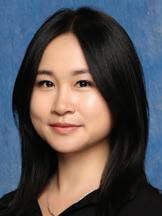
ADELINE XIE | Upper School Math & Science Teacher

At Hangzhou International School (HIS), students across the school have the opportunity to explore a wide range of Co-Curricular Activities (some 80 in total!) allowing them to pursue their passions and interests beyond the classroom setting by engaging in new experiences that foster adventure and curiosity.
Midi Chefs, which caters to students in Grade 2 to 4, aims to create a fun atmosphere for students to develop their fine motor, emotional, and social skills.
Every Friday afternoon in The Kitchen, our dedicted cooking space next to the cafeteria, students have the chance to work collaboratively to learn new recipes, practice culinary skills, and share their passion for cooking and food. Each week, the recipes

vary, featuring sweet or savory options or themed experiences like Halloween or Fall.
The Lower School students exhibit great excitement during every Midi Chefs session, as they express their creativity through “fun and messy” cooking experiences and develop a sense of accomplishment by enjoying the delicious food they have created.
Midi Chefs involves teaching hands-on practical skills through experiential learning that supports students in understanding the significance of preparation, time management, teamwork, and following instructions.
On a practical level, exposure to different culinary tools such as stoves, ovens, and

microwaves allows students to understand the operation of household appliances.
Even though Midi Chefs takes place outside of the classroom, the cooking experience fosters critical thinking and creativity among students. As they navigate their way around the kitchen space, students are required to think on their feet, adapt recipes, and solve unexpected problems that arise during the cooking process.
This hands-on approach aligns with the IB learner profile’s emphasis on being thinkers and inquirers, encouraging students to explore, question, and innovate in a realworld context. Approaches to Teaching and Learning (ATL) skills, such as thinking and self-management, are interconnected within the Midi Chefs program.
IVY GAO | Grade 4 Student
Hangzhou International School has an abundance of life.
Trees, mountains, and lakes circle our beautiful school. Insects live around our campus. They are part of our ecosystem. What some of us don’t realize is that living things are crucial to our community. They all deserve to live.
Most ecosystems consist of ‘mutualism’ and food webs. Mutualism is when animals depend on each other for survival. For example, anemones shelter clownfish, and clownfish in turn protect anemones from intruders.
An example of a food web is: first, female mosquitoes drink blood so they can nourish their eggs. Then, frogs eat the mosquitos. Finally, cranes eat the frogs.
Around the world, human-made disasters are plaguing the natural world. These ecological disasters include deforestation,
habitat loss, plastic and air pollution, illegal poaching and the most influential of all: climate change. All of these have a huge impact on our planet.
On the football pitch and playground in our community I have seen bees, wasps and dragonflies. Some of my classmates and I taught others that we don’t need to be scared of the animals in our campus because they defend themselves more than they hurt us.
The wildlife in our community is important but there are still people and animals in our community that misunderstand each other. Sometimes we can find people screaming because they saw bees. Other times we can find trash discarded around HIS that hurts the plants.
But sometimes we can discover people that care about our natural world. We see people picking up trash from bushes,


or taking snails from paths to prevent them from getting hurt. These people feel compassion for our natural world.
If we can all open our hearts to care for our friends, both the plants and animals, we can turn HIS into a community where humans and other living things can coexist peacefully, without fearing or hurting each other.
We should cherish the natural world around our school. Then we can all live peacefully and happily. That would be wonderful.


LIAM O’SHEA | Upper School Vice-Principal & MYP Coordinator
hat do you want out of education? What do you want out of life? What kind of world do we want to create for the future? How do we get there?
As a long-term international educator, and proud parent of two grown children who have both graduated from several IB programmes (PYP, MYP and DP) and universities, for me the answer lies in not so much what we learn and apply, but how we do this.
All IB programmes have threads that connect them: the ideas of internationalmindedness - developed through sustained focus on multilingualism, intercultural awareness; and global contexts; learner profile attributes; and service as action, among others.
For me, the most important aspect is ‘skills’. In the IB these are known as ‘Approaches to Learning’ or ATL, though I
prefer to call them Approaches to Life.
There are five categories, 10 clusters, and approximately 140 indicators that together make up ATL skills. In the Middle Years Programme (Grades 6 to 10) at Hangzhou International School, each of these are specifically introduced, taught, practiced, assessed and reported upon.
Every unit, in every subject discipline, and in every grade level, includes 2-3 ATL indicators. Examples include:
• Giving and receiving feedback (Communication);
• Listening actively to other perspectives and ideas (Social);
• Selecting and using technology effectively and productively (SelfManagement);
• Using critical literacy skills to analyse and interpret media communications (Research);
• Proposing and evaluating a variety of solutions (Thinking)


By experiencing these skills in different grade levels, different subjects, and in different contexts, students not only learn them, but also learn to identify and apply them deliberately.
By the time our HIS students get to the Diploma or High School Programme, these ATL skills have been practiced repeatedly and internalized by our students.
They know how to really communicate effectively, manage themselves and their time well, and also reflect on who they are as learners and people.
As our students graduate and go into further study, and from there to develop their own paths in life, we want them to be capable and confident. Approaches to Learning skills are truly skills for life!
CHELSEA WOOD | Speech Therapy & EAL and MUN Coordinator
The incredible 18th edition of West Lake MUN at Hangzhou International School (HIS) was a resounding success.
The three-day conference took place from 8-10 November 2024 and welcomed 200 delegates from 11 international schools across China, with over 70 students in the HIS delegation alone.
Its success was a testament to the school’s commitment to fostering global citizenship and collaboration and showcased the dedication and leadership of its Secretariat.
The Secretariat was selected in January 2024 and worked together over the past 10 months to plan and prepare for West Lake MUN XVIII. The Secretariat hosted a successful conference, grew together as a team in multiple ways, and exceeded their own expectations in creating a memorable weekend for every delegate.
The theme of the conference, “One Step Back, Two Steps Forward,” resonated throughout the event, inspiring all those in attendance to think critically and creatively about the challenges facing our world today.
Outside of the committee rooms, a major highlight were the two director workshops, which laid a starting point for a collaborative MUN network foundation across China’s international schools.




For myself, the passion and knowledge displayed by the delegates and directors left a lasting impression. The sense of camaraderie and collaboration that vibrated throughout the event was truly inspiring, highlighting the important impact these students can make to pursue their interests in global challenges and become impactful agents of change.
As the conference ended, it was clear that the Secretariat had exceeded their goal of creating a platform for meaningful dialogue and exchange. The feedback from delegates and directors was overwhelmingly positive, with many expressing their gratitude for the opportunity to participate in such a wellorganized and impactful event.
We are proud of the achievements at West Lake MUN XVIII, which remember is very much a student-driven conference. It was a memorable and inspiring experience for all delegates and directors, and serves as a shining example of this year’s Secretariat being the “agents of change” for MUN’s success story at HIS this year.

JANET MCGIFFORD | Upper School Visual Arts Teacher
he first semester was a vibrant hub of creativity that saw students showcase their artistic talents and individual expression across all grade levels in the Upper School.There was also a collaborative drawing project in October that engaged the entire school.
Grade 6 students engaged in landscape drawing using scratch art techniques, which served as an excellent introduction to the principles of line, texture and composition. Many students produced imaginative representations of natural scenes, demonstrating their understanding of depth and perspective, that effectively built confidence in experimenting with techniques and learning to express their unique visual styles.
Meanwhile, Grade 7 students investigated assemblage sculpture, creating threedimensional artworks from found objects. This project opened a dialogue about recycling and sustainability in art, resulting in imaginative and thought-provoking pieces. Many students incorporated personal narratives, honing their spatial awareness and design skills while considering the stories behind objects.

In Grade 8, students explored textures and forms inspired by oceanic themes, resulting in beautifully crafted clay vessels. The tactile nature of clay allowed for hands-on learning, with students implementing glazing techniques to enhance their final pieces. This project connected art with environmental awareness, prompting discussions on marine conservation.
Grade 9 students investigated abstract concepts through constructing a cardboard sculpture. By manipulating simple materials, they created striking sculptures that challenged traditional notions of form and function. This encouraged them to think outside the box and experiment with abstraction, leading to diverse interpretations that were visually engaging.


In Grade 10, students showcased their skills in a mixed media painting project. This culmination of their learning journey allowed them to integrate various techniques and materials, reflecting their personal artistic voices. The blend of paint and collage resulted in dynamic compositions that highlighted their growth as artists and prepared them for future artistic endeavors.
The semester also included an introduction to the IB Diploma Visual Arts course for Grade 11 students. They began their journey by exploring concepts for a 2D artwork using a range of media and techniques, from drawing and painting to textile art. This foundational experience equipped them with essential skills and encouraged them to think critically about their artistic expression as they prepare for more complex projects.
Additionally, Grade 12 IBDP Visual Arts students have been working towards their March exhibition, balancing their course requirements with the creation of high-quality artworks. This effort reflects their dedication and growth over the two-year programme.

Enhancing the semester’s accomplishments was the whole school Inktober drawing project, which invited students, teachers, and staff to participate in a month-long drawing challenge, which was displayed in an exhibition outside the Cafeteria. This initiative fostered collective creativity, with varied styles and interpretations, celebrating artistic expression and bringing the entire school community together.
Overall, this semester was a testament to our students’ growth and exploration in the visual arts, encouraging experimentation and self-discovery. The diversity of mediums and themes engaged students of all ages and enriched the school’s artistic community.




JIA CHEN QU & YANG (SUNNY) WENG | Grade 11 Students
tanding for Global Issues Network, the GIN Club offers an opportunity for senior HIS students to investigate real-world issues and find ways to create a difference in the community.
This year, soil composting became a popular project as students revealed a strong passion for the sustainability of resources and how organic waste can be reused to benefit our community. Students have observed how, due to the poor-quality and dry soil at the garden near the front gate, the flowers planted on the edge lack vibrant colors and visual appeal.
Therefore, through exploring various ways to enrich soil with organic matter content, the project aims to enhance the soil quality in the garden areas at HIS, allowing the flowers to prosper and become a welcoming decoration for all students, faculty and visitors.
Through concentrated research and discussions, the students identified methods for enriching the soil by creating organic fertilizer. Students brought organic waste, such as leftover pieces of vegetable and fruit peels, and kept it in a specialized composter filled with decomposing microorganisms. These plant-eating bacteria decompose the organic substances, producing a liquid fertilizer that provides multiple essential nutrients to the plants absorbing them.
The liquid was then poured on the lawn by the front gate, and the students
were able to compare the differences between the fertilized flowers and the natural growing flowers, allowing them to conclude the effectiveness of this decomposition method. The remaining organic matter was then transferred to large soil composters, where it is regularly moistened and rotated along with poorquality soil, enriching its nutrient content.
The experience of understanding the process behind soil compost and actively following the procedure taught the GIN team about the importance of sustainability, learning how to recycle and reuse waste that would have been piled up in landfills into practical uses.
The experience also drove us to consider other aspects of waste and trash disposal and how we could possibly reduce waste while achieving productive results. Furthermore, the continuous process of working on the project taught us a lot of learning skills, such as organization, resource management, time management, collaboration, communication, and much more.
Once again, special thanks to the CCA leaders, Ms. Rojas and Ms. Kushner, for their guidance and active support in laying the foundation of the project. Special thanks to Ms. Andrea for suggesting the front gardens needing the extra fertilizers. We hope this project will create a lasting impact and inspire more students to contribute to making a positive change in our community.




CLAIRE SUN, YOLCO MAO & YOLCY ZHANG
Grade 11 Students



Science has always been an important part of the curriculum here at Hangzhou International School, as well as a ‘must’ in the IB programme.
During our five years in the Middle Years Programme (MYP), we covered the fundamentals of Physics, Chemistry, Biology, and Environmental Science. This journey sparked our interest in science and inspired us, like many of our peers, to take science courses at a higher level in the DP.
Recognizing science’s significant impact in our school, we were inspired to give back to our community by launching Dragon Science, a magazine that allows students to explore and participate in the world of science.
With this inspiration, Dragon Science intends to provide a platform for students to explore further into their scientific interests and share their findings with others at HIS, at the same time helping IB students develop skills like curiosity, critical thinking, and
collaboration, which could also be beneficial for their future learning.
Our mission is to promote a passion of science in HIS students, encourage them to engage with the scientific field, and provide a platform for them to share their research and insights with the broader HIS community across different natural science subjects, across all forms of media, including articles, essays, research papers, and videos.
This project also seeks to provide readers with an immersive, advanced environment in which to investigate scientifi c information using free and easily accessible materials. By strengthening their understanding in areas of interest, students actively prepare for future science studies, including Internal Assessments (IAs) and the Extended Essay (EE).
Dragon Science aims to reach a diverse audience, including Lower School and High School students, as well as parents. To ensure the content is accessible to everyone, we present scientific knowledge
in an easily comprehensible way. For Lower Schoolers, Dragon Science introduces a fun field to them and sparks their interest. For High Schoolers, our objective is to provide formal knowledge and prepare them for college learning. At the same time, parents can gain insights into their children’s scientific learning journey at HIS. In the magazine, each article is accompanied by photos from contributors, which reveals an active class atmosphere to the viewers.
Our very first issue was published on December 10th and featured articles and interviews from a variety of sciencerelated fields, including the Robotics Team and GIN Club.
We hope this magazine will help students to develop their interest in science and provide fresh perspectives for their courses, as well as encourage them to actively participate in our project by contributing their own ideas and understanding in this fascinating field.
Please contact the authors if you’d like to contribute to Dragon Science!


NICHOLA HOLLINGSWORTH | Upper School Physical & Health Education Teacher, Duke of Edinburgh Coordinator
n a wintery weekend in midNovember, 20 students and five Hangzhou International School (HIS) staff headed down to the Tonglu areas of Hangzhou. This beautiful mountain spot would serve as the host for our Duke of Edinburgh’s International Award ‘Adventurous Journey 1’.
HIS is proud to offer the Duke of Edinburgh’s International Award, better known as the DofE, a program that equips students in Grade 9 and above with invaluable skills to assist in their future academic and professional careers. Students can complete six months
(Bronze), nine months (Silver), or 12 months (Gold) worth of activities that include physical recreation, helping younger children in elementary, volunteering with charities, and supporting our local Hangzhou community. During the fortnightly meetings, they also learn camp craft, first aid, and navigational skills ready for our expeditions in the wild.
The world-renowned award requires two overnight camps (known as ‘Adventurous Journeys’) to take place, the first to teach and check student’s wilderness skills and the second to demonstrate their skills in a challenging setting.
Setting out in high spirits, students arrived at what would be their first of many information sessions.They double-checked that their backpacks were balanced and their equipment properly compressed for optimal storage, before hiking up a steep hill to the campground.This hike showed students that even though they only went a small distance, when you add a vertical into the equation it can significantly slow your progress.
After arriving at the campground, students developed their navigation skills, practicing reading a topographic map and using a compass to plan their hike for the next day. As a student I developed my own

map reading skills doing the Duke of Edinburgh’s Award, and have been able to hike around the world confidently because of it.
Back at base camp, we then spent some time setting up our tents while surrounded by the color changing ferns, which added a beautiful backdrop.
Student were particularly excited when they got the opportunity to work with the radios, learning proper radio edict and practicing with their call signs to send messages to each other. To ensure physical map reading and not use of map apps, phones are strictly not allowed on the hikes, and so communication was only via the walkie talkies provided.
With the sun beginning to set we moved onto first aid, where students learnt about DRSABCD (Danger, Response, Send for help, Airway, Breathing, CPR and Defibrillation) and other essential information.
Students then worked in groups, using camp stoves to cook their own meals, before moving around a bonfire and enjoying the full moon and the singing and guitar playing by several students and staff.
“The decisionmaking skills that students learn and practice on these kinds of trips is the best life experience they can have.
“The Duke of Edinburgh’s International Award helps students develop their communication, leadership, resilience and teamwork”
The rain on this weekend provided a soothing sound for some to fall asleep, though for others it signaled that they better get outside and move their hiking shoes to keep them dry!
The decision-making skills that students learn and practice on these kinds of trips is the best life experience they can have. The International Award helps students develop their communication, leadership, resilience and teamwork.
Finally, Sunday saw the Bronze students tackle a 7km hike and the Silver students take on 12km - the award has three levels which gets progressively harder and longer.
Both groups faced steep downhill paths made more challenging by the rain but worked together as teams to overcome these challenges. They all did well and are well prepared for their next overnight camp in April.




WENDY ZHU | Grade 11 Student
HENRY TANG | Grade 7 Student
s famous film star Audrey Hepburn once said,“As you grow older, you will discover that you have two hands—one for helping yourself, the other for helping others”.
Driven by a commitment to help society, students Henry (Grade 7), Amy (G9), and Wendy (G11), co-founded the HIS International Volunteer Club this year, recruiting Mandarin Teacher Ms Lily Zhou, who has 17 years of volunteer experience, to serve as supervisor.
In the first semester, they have met with many experienced individuals in the city. Just recently, they invited a volunteer from the Hangzhou Red Cross Hospital who provided comprehensive first aid training and organized practical exercises for the students.
This initiative not only enhanced the student’s knowledge about volunteering but also instilled a profound understanding of the responsibilities required.
“The more that you read, the more things you will know. The more that you learn, the more places you’ll go”, as children’s book author Dr Seuss once said.
To gain more knowledge for the preparation of future volunteering trips, they students invited a famous local volunteer, leaders of the ‘West Lake Cultural Envoy Program’, and two survival experts who have worked with noted British explorer Bear Grylls in the past.
Zhang Nengqing was one of the 2022 Asian Game torchbearers. He taught the club members what it means to be a volunteer and shared some of his experiences during his many years of volunteering.
The most memorable was when he told the students about how he has been cutting disadvantaged people’s hair for free for the last 20 years. His volunteer work is centered around helping the poor, and the environment.
Meanwhile, Duan Xinyi is a leader from the West Lake Cultural Envoy Program, who assisted with the successful application to have West Lake designated a UNESCO World Heritage Site.
During the session, her team provided the members with historical information about West Lake, such as the story about Emperor Qianlong, who journeyed to West Lake six times in his life, and always commissioned paintings of the beautiful views.
The two survivalists, who had worked with Bear Grylls, are part of the local Red Cross rescue team. They introduced ways to protect yourself while in the wild, and listed important, possibly lifesaving items you should always take with you when heading out into the great outdoors.
During the lecture, they told the students how to identify different types of snakes, and what to do during various types

of natural disasters. They emphasized the importance of safety equipment by recalling dangerous experiences they had overcome through being prepared.
The International Volunteering Club is an exciting new addition to Hangzhou International School’s list of meaningful extracurricular options, which now consists of 80 activities for all ages. The hope is for club members, and the HIS community at large, to realise there’s so much they can do for society and will feel inspired to make the difference.
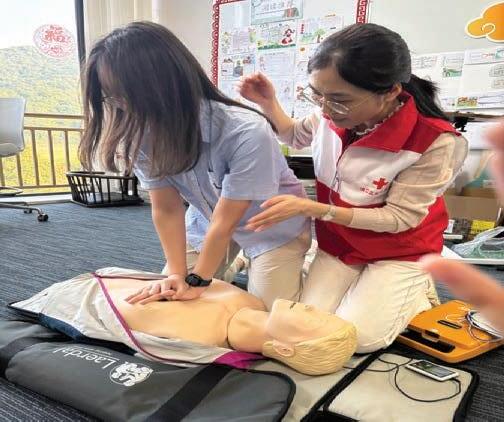
AKIRA SUGATA | Social Studies Teacher & Cross Country Head Coach
If you’re a coach, you understand the strange anxiousness you feel when you see your athletes performing on the field, the court, or the track.
In other sports, athletes can rely on teammates for encouragement or call for a time-out to regroup. However, in cross country and long-distance running, the anxiety is doubled. Once the starting gun goes off, the race becomes a contest against themselves, and it’s up to the individual to complete their race—leaving coaches to cheer and watch from the sidelines.
This year, our Cross Country team took 10 students to run another challenging course at the season-ending ACAMIS Championships held at Léman International School Chengdu in midNovember. With our overall team size gradually increasing, we were able to take three more athletes compared to last year.
Our season was filled with tough stair workouts, short fast intervals, accelerations, and some fun hiking trips up the mountains—all aimed at building their physical and mental endurance.
The increased mileage and strengthening sessions were all planned so that once the students were on the course, they could trust their training and their bodies to perform their best, given the conditions.
And trust their bodies they did. During ACAMIS, Helen Zhong (G8) and Julian Kuang (G8) took home gold medals in their respective U14 Girls’ and Boys’ divisions,
while the U14 Girls also secured third place, and our team placed third in the fun team relay, consisting of Helen (G8), Angela (G10), Vidhan (G8), and Julian (G8).
Every year, the athletes’ performances surprise me with the fire, determination, and resilience that burn in their eyes. All 10 of our students gave it their all, and we had excellent results to end the season.
We also had an exceptionally large group of 5th graders join us this year for Cross Country, who left stellar records but were not eligible for ACAMIS. We are excited to see them return next year for a taste of what it’s like to run in a championship race. Our notable Middle School runners will also be transitioning to High School, changing their distances from 3km to 5km.
Though my anxiety as a coach will heighten year by year, as our athletes continue to improve their personal bests, each race becomes even more exhilarating and thrilling to be a part of. As Head Coach, I am so proud of our growing team and look forward to how they will continue to surprise me on the course next year.
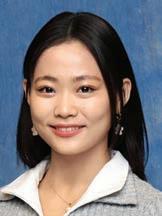









GABBY HE | Marketing & PR Officer
s I browse through the photos and video clips taken at the Jeju Invitational Volleyball Tournament, held on the island from 25 to 28 September 2024, I find myself reflecting on the whirlwind of emotions and experiences from this four-day, threenight overseas tournament.
I was fortunate enough to travel to Jeju Island with the HIS volleyball team to document their precious time abroad playing sports and representing our school.
From the moment we arrived, we were embraced by the vibrant landscapes of Jeju. Our first stop, Dolhareubang Park, was an enchanting introduction to Korean culture. The iconic stone statues, regarded as the guardians of the island, tell tales of protection and good fortune. Our students were engaged with the local history, and fascinated by such an artform.
The laughter as they posed with the statues and their happy dance moves became a poignant reminder that education extends beyond textbooks. Afterwards, the UNESCO heritage
Seongsan Ilchulbong, with its volcanic terrain, clear ocean water, and swaying green grass, offered us breathtaking scenery of the island.
Then there was the volleyball, where the level of competition was intense. The HIS varsity volleyball teams were playing against formidable teams, and I could see the determination etched on our players’ faces. One of our senior players, Gaspard noted, “Our main goal was to try and teach the younger ones in the team, but this trip also helped us learn a lot because we were playing with way better teams.” This learning curve was evident in every match, as they adapted their skills and strategies on the fly.
As his fellow player Ronan added: “We went into the second season knowing and understanding how good the teams in Korea were going to be, yet we were still able to persevere throughout the matches.”
With a camera in my hand, I had the privilege of capturing these moments of growth – each spike, block, and serve weaving a story of perseverance and resilience.

James’ reflection also resonated deeply with me: “Even though it wasn’t the best result we wanted, over the tournament we became closer friends and the team became more like an actual family.”
Volleyball wasn’t the only thing driving this sentiment; it is these shared experiences that help form unbreakable bonds that last for many years.
During timeouts, our volleyball players analyzed strategies with their team mates, expressing their passion for the sport.
Tonya’s enthusiasm echoed in her words: “I had a lot of fun being on the court, playing with all my friends and playing the sport that we all love.” My camera captured not just the sport, but their love for it—a reminder of why these young athletes play.
Claire’s insight on competing against different teams was invaluable: “In Hangzhou, we typically only play teams from Shanghai or nearby areas. However, in Jeju, we had the opportunity to compete against teams from Korea. This experience helped us identify our weaknesses and learn how to improve.” This echoed the essence of sports— growth through challenge.

Vinisha’s excitement at the volcano sightseeing brought a smile to my face: “I’ve wanted to come here for a long time; this trip is like a dream come true.” I realized that this trip would become a cherished memory for many students, woven into the broader story of their high school years.
Cameron expressed what many first-time participants felt: “I was very happy when I got invited because it’s a big opportunity for me, and Jeju is a really nice place.” His words highlighted how this trip was not just about competition but also about exploration and personal growth. Each player carried the HIS Dragon spirit within them, ready to embrace new cultures and experiences.
It’s a rich narrative of athleticism, friendship, and youth captured through the lens with genuine smiles, determination, good food, and heartfelt moments. A tournament like this is a microcosm of life, full of challenges, lessons, and the beauty of adventure.
The Jeju Invitational Volleyball Tournament was not merely a sporting event; it was a bridge linking cultures, showcasing the power of teamwork, and fostering lifelong memories.
In putting together the documentary video, I felt gratitude for having witnessed these young athletes not only strive for victory but also embrace their journey together. As they look back on this journey through the lens, they will remember their strength, their friendships, and the beauty of stepping out of their comfort zone for years to come.
In the end, this trip to Jeju was a reminder that the true essence of sports lies not just in the medals won, but in the unforgettable experiences shared and the friendships forged along the way.



DragonNews magazine is published four times a year and is shared with the HIS and wider Hangzhou communities.
If you would like to contribute an article, have a suggestion for content, or want to ask a question, please email: marketing@hisdragons.org.cn
Designer: Shaian Gutiérrez
Editors: Simon Ostheimer & Chantelle Nguyen
Thank you to the members of the Communications Team, Gabby He and Natalia Stubbs, and to all of this issue’s contributors. Articles and photographs are provided by the HIS administration, faculty, students, and parents.
WE ARE SOCIAL
Stay connected with HIS through our social channels:





















“Through my role as the Secretary General for HIS Model United Nations, I gained valuable experience in the legal field. In national level debate tournaments I learned the skills required to effectively articulate and communicate legal arguments. I found myself thriving in this challenging, yet stimulating environment, and it only cemented my decision to pursue Law.”
Class of 2024, Class Historian



Studying Law at University College London, World’s Top 10 University* Attended HIS for 10+ years, graduated with a High School Diploma and the IB Diploma



HIS is an award-winning international IB World School situated in the beautiful city of Hangzhou that offers both a rigorous and well-rounded learning experience beyond the classroom. We serve over 970 children of foreign nationals in Early Years through Grade 12 and represent more than 50 nationalities in our diverse community.

Once a Dragon, Always a Dragon!
2190 Xiangbin Road, Binjiang District, Hangzhou 310052 +86 571 8669 0045 info@hisdragons.org.cn www.his-china.org
For further inquiries, please contact the Admissions Department admissions@hisdragons.org.cn
Founded in 2002, Hangzhou International School was the rst international school in Hangzhou and remains the only non-pro t, WASC accredited, IB World School in Zhejiang province.
